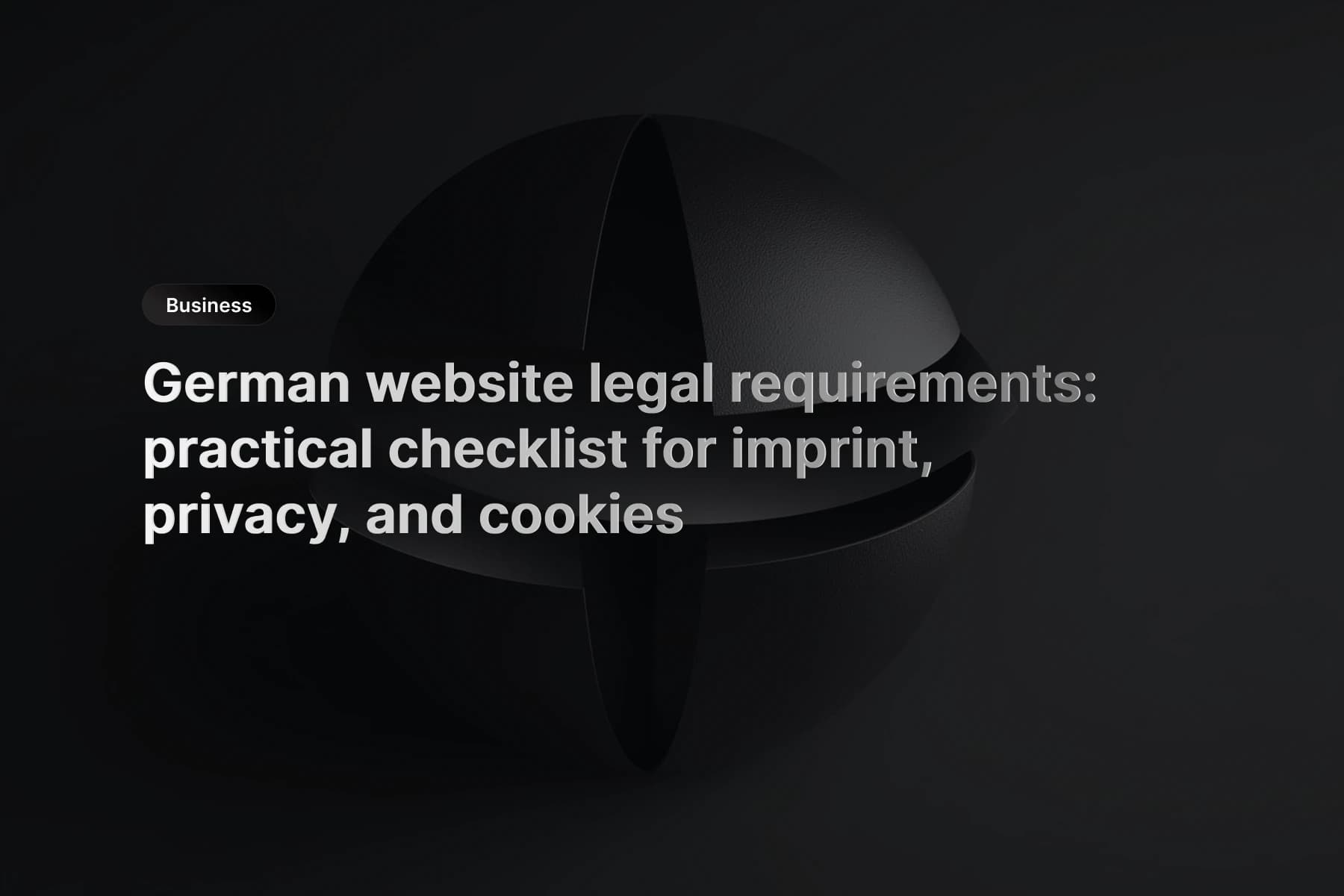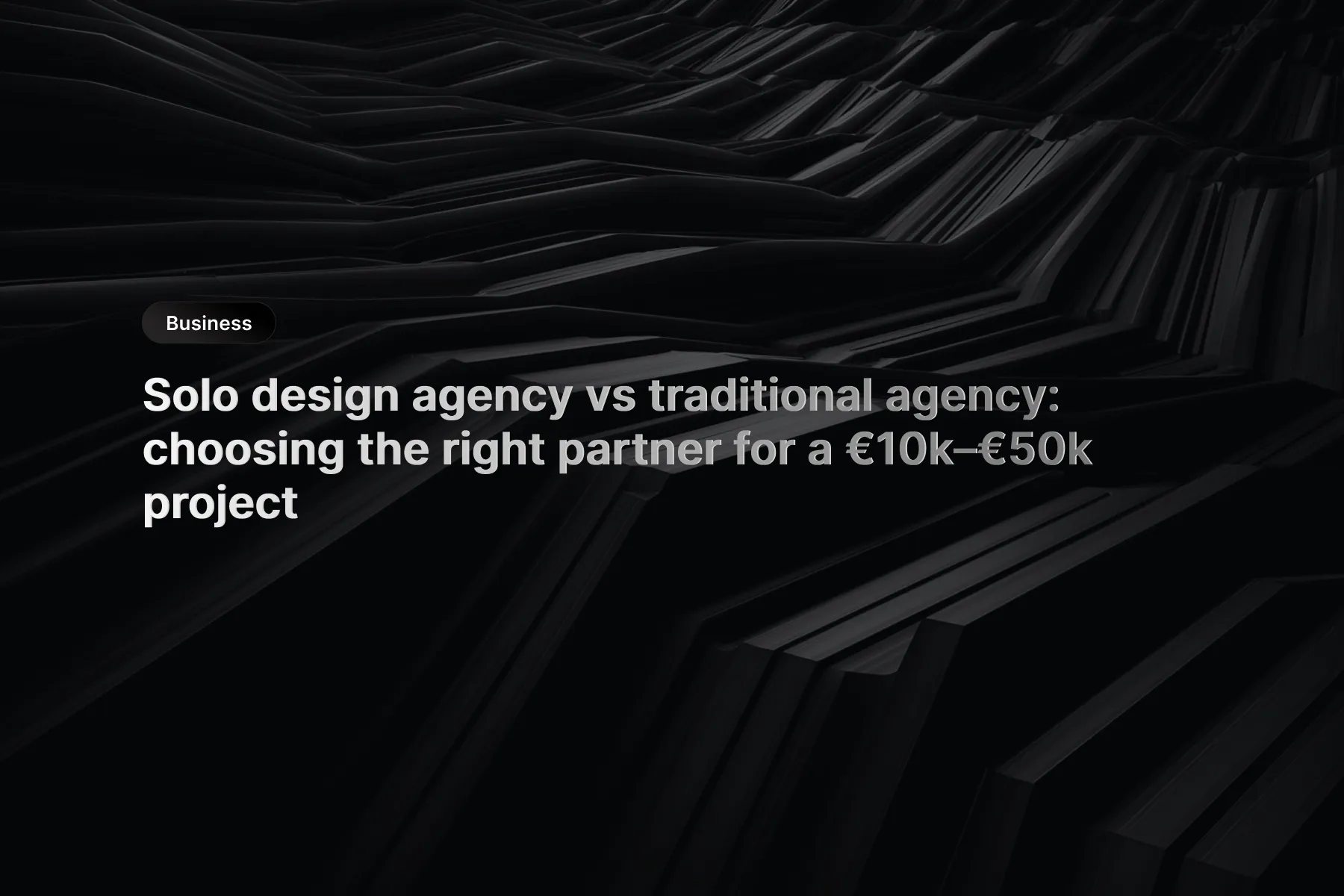This article shares practical criteria for evaluating web design partners in Germany. It does not replace legal advice. For binding guidance on contracts and compliance, consult a qualified lawyer.
Why “any agency” is not enough for German business sites
Typing “web design agency germany” into a search engine returns more options than anyone could reasonably evaluate. Many of these providers look similar at first glance: nice case studies, familiar layout patterns, praise for performance and SEO.
What is much harder to see from a landing page is whether the team behind it understands how websites actually operate within German law and practice. If your site is operated from Germany, you are responsible for complying with German and EU rules—even if your designer sits somewhere else.
The goal here is not to build fear around compliance. It is to highlight the difference between a generic “we build nice websites” agency and a partner who is comfortable working within the German context: imprint obligations, GDPR-based privacy notices, cookie consent under the TDDDG, and realistic expectations around hosting and data processing agreements.
The article on German website legal requirements covers those obligations in more detail. This one focuses on how to see whether a potential partner will handle them well without you having to micromanage every detail.
What “Germany-aware” looks like in practice
A good sign is not a long list of legal buzzwords in the proposal. It is small, concrete behaviour.
On their own site, the imprint and privacy pages look current, complete, and easy to find.
They talk naturally about GDPR, consent, and hosting locations without trying to turn every question into a mysterious topic.
When you mention your existing tools—analytics, newsletters, booking, payments—they immediately discuss how those fit into consent and privacy instead of only talking about visual integration.
None of this turns them into lawyers. That is not their role. But it shows that their everyday design and development decisions are made with German and EU requirements in mind instead of treated as an afterthought.
Agency, studio, or solo specialist?
The German market is full of different labels: Agentur, Studio, Freelancer, Beratung. From a client’s perspective, what matters more than the label is how the work is actually done.
Traditional agencies often bring multiple roles: project management, design, development, sometimes copywriting and performance marketing. This can be useful when you truly need several disciplines at once and have a larger internal team.
Solo studios and small boutiques offer something different. The same person handles strategy, UX, and implementation for a focused number of projects at a time. There is less internal hierarchy and fewer hand-offs, but more dependence on one individual.
The article on solo design agency vs traditional agency explores that trade-off in depth. For German clients, the additional dimension is whether the partner understands local rules. A one-person studio with deep EU/German experience can be safer than a bigger agency that treats legal topics as “the client’s problem”.
Questions to ask before signing anything
You do not need to run a full legal due diligence on every provider, but a few pointed questions during early conversations can reveal a lot.
Ask how they normally handle imprint and privacy pages. If the answer is “we copy a generator and paste it in”, that is a warning sign. A better answer sounds like “we help structure the pages and integrate texts you or your lawyer provide, and we keep links visible from every page”.
Ask how they implement cookie banners and consent. Listen for details. Do they talk about waiting to load tracking scripts until consent is given? Do they mention the difference between technically necessary and non-essential tools? Do they understand that designs which make rejection much harder than acceptance have been criticised in case law?
Ask where your site will be hosted and which services will process data. A reasonable answer explains EU-based hosting options, how content delivery networks fit in, and how they handle data processing agreements for tools they suggest.
These questions do not require you to be an expert. You are listening less for perfect answers and more for a clear, confident explanation that shows they have thought about these issues repeatedly.
Red flags in proposals and websites
Some warning signs show up before you even talk to a provider.
If their own site is missing an imprint or privacy page, or still references old laws like “§ 5 TMG” without mentioning the DDG, they are not keeping up with the basics. The same applies if their cookie banner claims to be “GDPR compliant” but only has a single “OK” button with no way to decline.
In proposals, be cautious of extremely short timelines or surprisingly low prices that come before any serious discussion of your requirements. German legal obligations do not disappear at lower budgets; they just become corners to cut.
Another red flag is a complete separation between “design” and “legal”. Hearing “we do not think about that at all, that is your job” for every question about consent or privacy suggests you will be the one catching issues after launch.
Turning local awareness into a selection advantage
The point of asking about legal awareness is not to disqualify every provider who does not sound like a lawyer. It is to find partners who can implement your lawyer’s guidance without constant translation, and who design and build in ways that make compliance easier rather than harder.
When you compare providers:
Look at whether their own site meets the basics described in the German legal requirements article.
Use the hiring frameworks from the business leader’s guide to hiring web developers to evaluate communication, reliability, and portfolio.
Overlay a few locally focused questions about imprint, privacy, cookies, and hosting.
If a provider can talk through all of that calmly and clearly, you are likely looking at someone who can handle both the design and the environment your site must live in.
Using this perspective in your next search
The next time you search for a “web design agency in Germany”, you will still see hundreds of options. The difference is that you will know what to look at beyond the portfolio grid.
If you want to see how a solo studio with German context positions this transparently, the services overview and the business websites service page on this site are designed with exactly that in mind. Regardless of whom you choose, using the questions in this article as a quick checklist will help you separate glossy presentations from partners who can actually support your business within the German and EU framework you work in every day.

